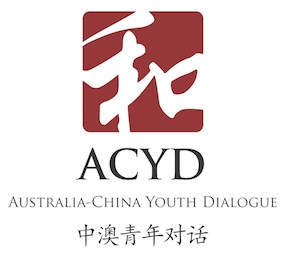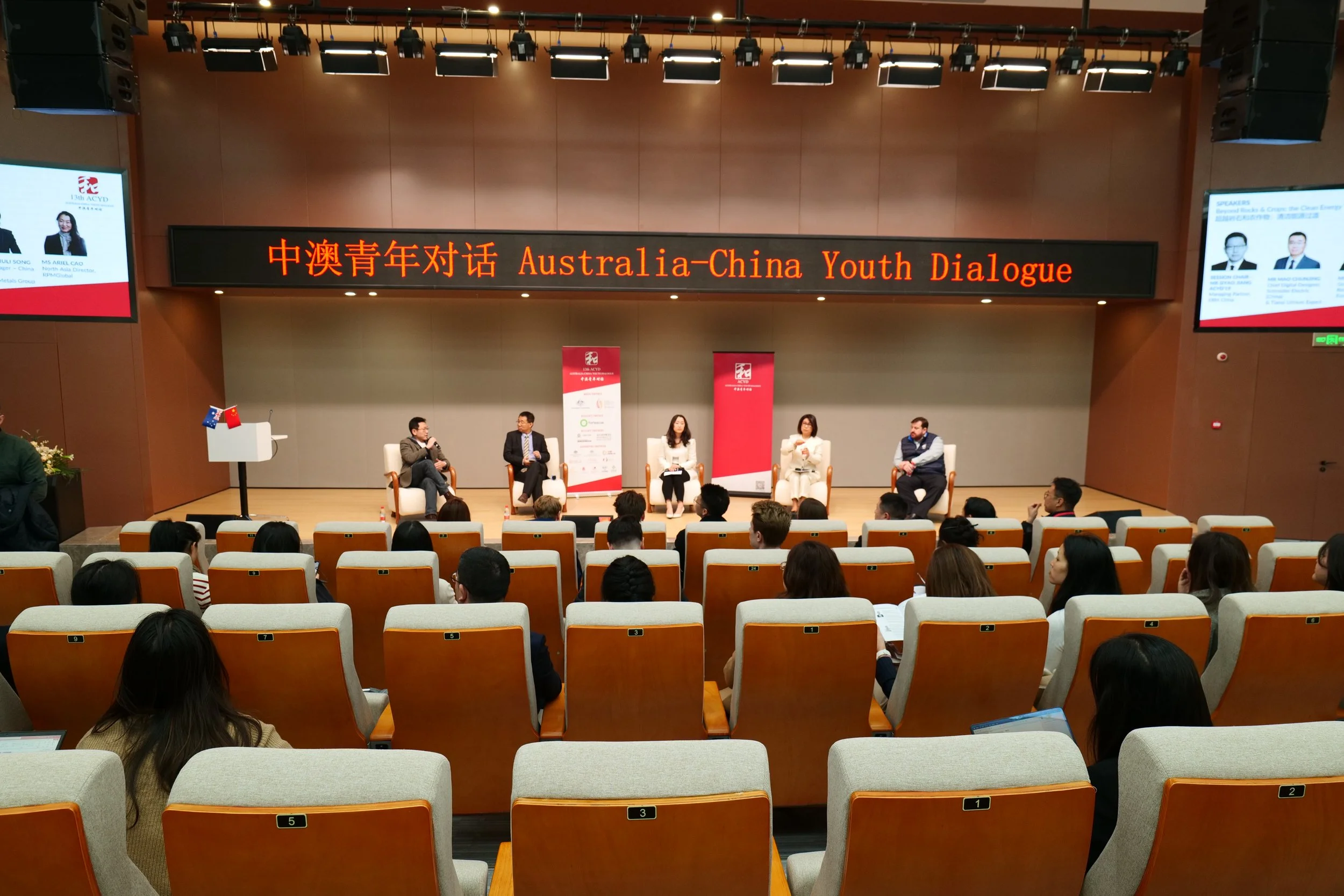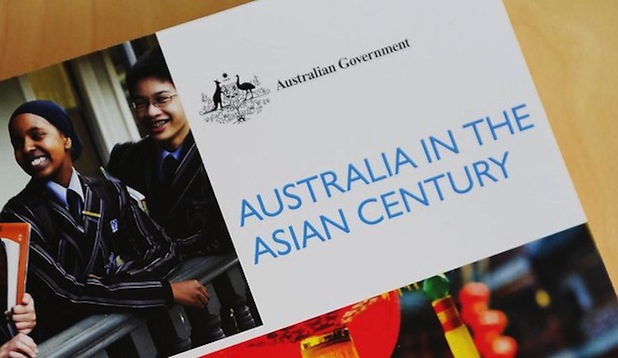Hong Kong-born Wesa Chau is a Labor candidate in the Australian federal election
Growing up in Hong Kong, Wesa Chau Wai-sum never thought she would enter the world of politics. But a move to Australia when she was seven changed all that. Now 31, Chau is hoping to become Australia's first Asian-born member of the House of Representatives, running as a candidate for Prime Minister Kevin Rudd's ruling Labor Party in the September 7 federal election.
ACYD Publications Manager, Neil Thomas: 'It's not the Asian dream, it's the reality'
IN a recent article Rude awakening from Asia study dream, Natalie Karam questioned whether there was sufficient demand from Australian students for the Asia study abroad opportunities offered by the ALPs Asiabound scheme and the Coalitions broader New Colombo Plan.
Ms Karam raises salient points that need to be addressed for the Australian educational sector to thrive in the Asian Century. But her factual premise is not completely sound, her arguments accept stereotyped views of Asia as unchangeable, and she does not mention Asian languages.
Firstly, there in fact does seem to be demand for Asia study. Bernard Lane reported in The Australian that the first round of Asiabound grant applications was heavily oversubscribed, and that a full allocation of $10.6m has been made to 52 institutions to provide opportunities for 3700 Australian students to participate in semester, short-term, and language study programs in Asia.
Despite the quoted concerns of an industry professional that student interest will not match allocations, as universities and not individuals make Asiabound applications, it is unlikely the money will not go towards inducing student participation in new Asia study programs. This is because universities must return any unspent funding. Furthermore, Asiabound allocates $3m to fund a national campaign promoting the benefits of Asia study to students and parents.
We should not underestimate the power of political leadership and financial incentive to impact the attitudes and choices of the Australian population.
The article also ignores booming Australia-Asia youth engagement. The Australia-China Youth Association Group alone boasts over 5000 members across chapters in 20 Australian universities, with high-level support from the ANU and DFAT. The Australia-China Youth Dialogue, Australia-India Youth Dialogue, Australia-Korea Youth Dialogue, and Australia-Indonesia Youth Association have all been founded and grown rapidly over the last few years.
Secondly, I agree with Ms Karam in the sense that student demand could indeed be higher. She insightfully identifies many reasons why Australian students “haven't quite embraced the fact that our future is inside of Asia”, but she accepts cultural stereotypes as immutable barriers and does not offer solutions.
Essentially, “Asia does not seem new, exciting or different to us…the casual familiarity we have with the region is a turn-off.” I concur with Ms Karam that it is ignorant to assume that “eating pad thai” and “lazing by the beach” mean you have ‘experienced Asia’.
But Australians should not just accept Michael Wesley’s insight that we are “insular internationalists”, well travelled but ignorant of the places we go. It seems the problem is that Australians do not know enough about Asia to realise how diverse and interesting it really is, and that it boasts texture far richer than its tacky tourist hotspots.
Education is the key. This is precisely why we need political support and promotional funding for programs like Asiabound and the New Colombo Plan, to show Australian students that Asia is in fact a dynamic and liveable region, not just a place to swig Bintangs and splurge on room service.
The ‘Asia and Australia’s Engagement with Asia’ national curriculum priority is also a positive step towards expanding the cultural and educational horizons of future generations.
Thirdly, a topic absent from Ms Karam’s article is what I believe to be a major reason why student demand for Asia study has not been as high as it should be; Asian languages.
Judging from the article and her LinkedIn page, it seems Ms Karam does not speak an Asian language. From my own experience, this can be a game changer. People naturally prefer to interact in their first language, especially in their own country. Ms Karam’s lament that living in Asia is disappointing compared to holidaying there due to the lack of “student life” is misguided; it exists everywhere but is primarily conducted in the local language.
The article also depicts Asian students as distant and perplexing: “Our relative ‘otherness’ was intriguing to one another.” But the language of cultural inscrutability masks the reality of fundamental human commonalities behind different beliefs and customs. The key is being able to communicate them.
I am not saying that studying in Asia without an Asian language is worthless, it is an invaluable experience that I would recommend to any Australian, but if you met an Asian student in Australia who could not speak English I doubt you would invite him to the pub to have a drink and watch the footy. Language and cultural participation are intertwined when Australians go to Asia too.
I study Chinese (with law and politics), and whilst I am not eloquently fluent, being able to hold my own at the dinner table and read the Chinese news has led to meaningful friendships, professional employment, and an increasing ability to partake in Chinese society.
So, whilst Asiabound and the New Colombo Plan are laudable policy, a better way to promote tertiary study in and of Asia would be to implement the 2012 Australia in the Asian Century White Paper recommendation to teach Australians an Asian language throughout primary and secondary school. That would mean they are interested and equipped for immersing themselves in an Asian society when they start university. Learning a second language at university is possible, but the younger you are the better.
However, prospects are uncertain. In 2010, the Department of Education, Employment and Workplace Relations released a report showing Asian language schooling in free-fall, with for instance only five per cent of Australian schools teaching Chinese. Neither the ALP nor Coalition has committed funding to realising the White Paper’s aspirational goal, though the Coalition have announced a target of 40 per cent of school graduates speaking a foreign language within a decade.
Australia should follow the example of the Victorian state government, the leader in realising the possibility of a bilingual Australia through its ‘Vision for Languages Education’ policy and Hamer Scholarship program.
Speaking the languages and understanding the cultures of Asia would enrich the social life of the nation, augment strategic involvement in the region, and boost business within the interaction-based non-primary sectors the Australian economy rapidly needs to diversify into. Monolingualism is not a national strength.
Ultimately, to argue that current lack of huge demand justifies winding back educational engagement with Asia is prematurely defeatist.
Asia is not a dream we need to awake from. It is a reality we need to act upon.
This article first appeared in The Australian on the 30th of August 2013: http://www.theaustralian.com.au/higher-education/opinion/its-not-the-asian-dream-its-the-reality/story-e6frgcko-1226706743870
ACYD Publications Manager, Neil Thomas: 'Asian White Paper or white elephant'
Kevin Rudd's speech to the Lowy Institute yesterday underscored the value of deepening Australia's engagement with Asia. It's a message the next Australian government - whether Coalition or ALP - needs to take seriously, argues Neil Thomas. At the Lowy Institute in Sydney yesterday Prime Minister Kevin Rudd delivered the first significantspeech of the election campaign about Australia's international relations.
Most coverage of the speech centred on controversial plans to move naval assets from Sydney to Brisbane and possible humanitarian intervention in Syria.
Much less reported, though possibly of more long-term significance, was Rudd's vision of Australia as an activist regional and global middle power. He emphasised that "we are now living in the Asian century, this is no longer a prospect, this is a reality".
There is now bipartisan acknowledgment that Australia is increasingly economically, diplomatically, and strategically reliant on Asia, and China in particular.
But according to Rudd, shifting Chinese growth patterns mean "Australia's prosperity is simply no longer assured on the back of the China mining boom alone...To ensure future prosperity we must diversify our economy”, he said, by exporting agriculture and professional services to rapidly-growing Asian consumer populations.
However, for Australia to negotiate fierce global competition and position itself successfully in Asia will "require investment, education, training, and systemic not episodic engagement by governments".
To this end, Rudd endorsed the Australia in the Asian Century White Paper as "the most comprehensive review of Australia's regional engagement strategy for 20 years", asserting that to become prosperous Australia must become "comprehensively Asia-literate".
Rudd's speech yesterday was the first significant mention of Asia-literacy or the White Paper during this election campaign.
When then-PM Julia Gillard unveiled the White Paper in October 2012, she hailed it as a flagship "road map for national success".
It boldly recommended that Australian schoolchildren be offered continuous education in one of four priority Asian languages – Mandarin, Hindi, Japanese, and Indonesian – and proposed aspirational targets for a third of business directors and senior public servants to possess "deep experience in and knowledge of Asia" by 2025.
Rudd has benefited from extensive Chinese language and Asian studies education and as a backbencherendorsed it as "a wake-up call for all Australians".
But the ALP has yet to place significant political capital or funding behind actually implementing the White Paper's proposal to reverse Australian mono-lingualism and revolutionise Asian language education.
Rudd's speech was stirring stuff, but it contained too much rhetoric and not enough concrete proposals.
Given such issues scarcely register in marginal-electorate calculations, perhaps it was a final ambassadorial flourish before being voted out of office?
The fate of the White Paper under a Coalition government is uncertain.
Encouragingly, the Coalition has declared a target to have 40 per cent of school graduates speaking a foreign language within a decade.
But Tony Abbott’s reaction to the White Paper's call for a more Asia-literate nation echoed John Howard'srefusal to engage with Australian cultural identity beyond the Anglosphere when he commented that "the best guarantee of Australian participation in the Asian century is a strong economy".
Julie Bishop has also echoed such sentiment during this election campaign, confirming the Coalition would pursue a narrow vision of "economic diplomacy" focused upon business and trade.
But is Asia-literacy even important for Australia's national future?
Pundits argue that Australia is doing well and does not need to be Asia-literate (or anywhere-literate) because "money talks in any language".
But such views exemplify the present complacency of an Australia that has not experienced recession for two decades, which has not prepared itself well for the future and the necessary structural adjustment to our educational institutions and socio-economic systems in order to thrive in the Asian Century.
Understanding the cultures and speaking the languages of Asia is key to ensuring Australia's long-term economic success, as business would flourish with amplified people-to-people engagement, intergovernmental trust, and strategic involvement in the region.
This is especially so within the dynamic non-primary sectors Australia needs to develop, where success is based far more upon networks and interactions than mineral deposits.
To be fair, firm political commitments have been made to Asia-literacy at the tertiary level.
The ALP's Asiabound scheme will provide $10.6m for 3700 Australians to study in Asia.
The Coalition's New Colombo Plan goes further by supporting mass tertiary programs and internship placements, proposing to make Asia study "the norm".
But presence alone does not guarantee meaningful engagement, and most participants will still learn and live in English.
A better way to promote tertiary study in and of Asia would be to teach Australians an Asian language throughout primary and secondary school, so that they are interested and equipped for immersing themselves in an Asian society when they start university.
But, for instance, only five per cent of Australian schools currently teach Chinese.
Implementing the visionary language education recommendations of the White Paper, accompanied by the new national curriculum, reversal of tertiary funding cuts, expanded language-teaching, skilled migration, and support for cross-cultural youth organisations, would unlock myriad national, social, and frankly human benefits that spring from fluency in other languages and cultures.
Australian engagement with Asia would be welcomed and reciprocated by the polities and publics of countries where attitudes towards Australia tend to be deservedly coloured by indifference at its perceived irrelevance or perhaps of cultural xenophobia (that focused animosity towards asylum seekers does not help to quell).
So hopefully the party that takes office on September 7 will defy the initial predictions of many commentators: that the will and funding to realise the White Paper's vision for an Asia-literate Australian population will not materialise.
Australia has a unique opportunity to become a geographically close, economically important, and culturally competent Western country in Asia. This promise could be squandered by a failure to invest in Asia-literate human capital.
This article was first published on the 28th of August 2013 in 'The Drum': http://www.abc.net.au/news/2013-08-28/thomas-asian-white-paper-or-white-elephant/4917896
2013 Australia-China Youth Dialogue: Press Release

Australian and Chinese young leaders are again set to engage in frank and forthright dialogue about shared regional challenges at a key forum in Australia in September.
The fourth annual Australia-China Youth Dialogue (ACYD) will bring together 30 exceptional young leaders from both countries over five days to explore issues and trends affecting the two nations’ relationship.
ACYD Founder Henry Makeham said the event would present several sessions each with a panel of experts considering critical issues facing the bilateral relationship, such as Australia and China’s roles in the international climate framework.
“Influential speakers such as The Hon. Kim Beazley, Australian Ambassador to the United States, Professor The Hon Gareth Evans AC QC, Secretary to the Department of Foreign Affairs and Trade, Dennis Richardson AO, and Secretary to the Department of Foreign Affairs and Trade, Peter Varghese AO are just some of the names that will lead opening address, panel discussions and keynote speeches for delegates to engage in lively discussion on Australia’s economic, security, trade and cultural relationship with China”, Mr Makeham said.
“The 2013 ACYD is an outstanding opportunity for delegates, between the ages of 18-30, selected from hundreds of applicants, to develop more sophisticated understandings of each other’s nations. ACYD’s most valuable asset is its ability to generate real and meaningful dialogue and develop genuine friendships between the young people who will one day be responsible for the ongoing development of the bilateral relationship”.
Mr Makeham said this year’s Dialogue – guided by the theme Asia Dream – follows several highly successful past Dialogues held in both China and Australia.
“For this year’s Dialogue, as a unique activity in partnership with the Australian Broadcasting Corporation (ABC) International, delegates will visit the ABC Centre and learn about developments in the digital and online space being used to drive engagement with Chinese audiences.”
Natalie Cope, Director of the ACYD said that delegates will receive a fast track introduction on how to create creative and engaging content that can be used to connect with audiences and tell stories in an inspiring fashion.
“Following this session delegates will have the opportunity to produce interesting, engaging and creative user generated content to express themselves”, she said.
The ABC International will shortly release a smartphone App which will provide a unique platform to share this content with audiences in Australia and China.
The 2013 ACYD is presented by the Australia-China Youth Association in partnership with the China University Media Union and the All-China Youth Federation’s ‘Dialogue with the World’ series.
It will be held in Canberra from 24-27 September, and in Melbourne from 27-29 September.
Major sponsors include The Australian National University, Victorian Government, The Australia-China Council (Department of Foreign Affairs and Trade) and Asialink.
For more information on the ACYD 2013 visit www.acyd.org.au
Contact for media enquiries: Christine.Christmas@acyd.org.au
ACYPI Publication: 'Enhancing the Australia-China Relationship'
In response to the Australian Government’s ‘Australia in the Asian Century’ country strategies, the Australia-China Young Professionals Initiative (ACYPI) conducted a survey of over 400 young professionals across Australia over one week in May. The survey results, released today in ACYPI’s ‘Enhancing the Australia-China Relationship’ report, show business and government must do more to build a base of Australian and Chinese professionals and entrepreneurs to bring Australia into the Asian Century.
In reflecting on ACYPI’s report, Business Review Weekly said ‘it is understandable that Australia’s current business leaders have a greater orientation towards the country’s traditional centres of influence such as the US and Europe.’ 69% of respondents had neutral or no idea of the general points of the Australia in the Asian Century White Paper, respondents continued to favour traditional markets such as the US and UK over Asian countries for work experience and fewer than 50% of respondents worked in a business that valued and encouraged Chinese cultural and literacy knowledge. ‘Of greater concern, perhaps, are signs that the next generation shows the same orientation.’
ACYPI Australia Executive Director, Edward Kus, said the survey results demonstrated that ‘young professionals are interested in the Asian Century but struggling to engage with its core issues’.
How do you see the Asian Century? Join the discussion on LinkedIn: http://www.linkedin.com/groups/AustraliaChina-Young-Professionals-Initiative-ACYPI-3744368
ACYD Alumni Huw Polhner article in Australia-China Connections: 'Internships will help build Asia skills'
If Australia is serious about its position in the Asian century, more opportunities for Asian-based internships need to be available for Australian students and graduates, writes Asialink’s Huw Pohlner.
Australia needs urgent, coordinated action to overcome our asymmetric engagement with Asia and improve our Asia capabilities and intercultural intelligence. This will require substantial new resources, including providing opportunities and incentives to gain Asian experience.
Our relationship with China provides an example of the asymmetries in Australia’s Asia engagement. Australia’s resources trade with China has grown exponentially for over two decades, and Chinese international students now far outnumber any other foreign national group in Australian schools and universities. But the number of Australian students from non-Chinese backgrounds who study Chinese at year 12 languishes at only 300 or so in any given year.
Only 6 percent of Australian year 12 students study any Asian language, a figure that has remained static for over a decade. And university exchange student and intern flows out of Australia are limited and continue to favour experience in developed Western economies.
Internships and other forms of work experience in Asia will be fundamental in addressing this imbalance, building greater understanding and connections with Asia and developing an Asia-capable Australian workforce. Business, governments and educational institutions must work together to build demand for – and increase the supply of – targeted internship opportunities for Australians across the Asian region.
Asialink’s 2012 report, Developing an Asia Capable Workforce, found that Australian businesses see capability issues as among the greatest impediments to planned expansion into Asia. Less than half of 380 businesses surveyed had any board members or senior executives with Asian experience or language ability.
Peer-reviewed research and global business experience highlight the benefits of spending time overseas to global-mindedness and, in this context, Asia capability. The Asia Capable Workforce report listed ‘extensive experience operating in Asia’ as a key component of Asia capability. One of the most effective and lasting ways people can gain such experience is by working and/or studying in Asia, including through exchanges and internships.
But too few Australians are gaining such experience in Asia. International study experiences and internship opportunities for Australians remain weighted in favour of advanced English-speaking economies.
Internships contribute to the development of not just knowledge, but also practical skills and professional networks. They are accessible to workers and students alike, including through secondments arranged by Australian employers. Internships can also be undertaken before, during or after a period of educational exchange to an Asian country. Aside from being relatively short in duration and therefore broadly accessible, internships have the major added benefit of increasing employability.
Empirical studies support anecdotal evidence that university graduates with internship experience are perceived to be better prepared to enter the workforce and more marketable to employers. A 2013 survey of final-year undergraduates in the United Kingdom revealed that students with internship experience were three times more likely to get job offers before graduating than their peers without such experience.
But internships must be designed and implemented appropriately. Well-designed internships can contribute to Asia capability if three core internship components (experience, networks and knowledge) are explicitly incorporated into an Asia-focused program.
Australians need access to internships that are deliberately designed to build their Asia capabilities. For this to happen, business, government and the education sector will need to work together, and efforts to improve access to opportunities must be matched by efforts to increase demand.
Businesses should establish new or expand existing internal programs – and partnerships with universities and internship providers – to open up their offices in Australia and across the region to interns. They must continue to communicate to government and the education sector the importance they place on Asia capability and the relevance of practical work experience.
Governments should further implement the recommendations relating to Asia-relevant capabilities made in the Australia in the Asian Century White Paper. State and federal governments should support further academic and industry research to assess the impact of internship programs on Asia capability and employability.
Universities should expand student mobility programs in Asia to allow more students to include time there as a credited component of their degree program. Student exchanges should be supplemented with practical professional internship opportunities where possible. The relevance and importance of practical experience in an Asia-focused organisation to students’ future careers should be promoted, moving away from an Anglo- and Eurocentric view of overseas opportunities.
Above all, internships must be designed and implemented according to best practice in program management and developing Asia capability. High-quality internships will generate further demand, especially if supported by the business sector through clear indications that Asian experience is highly valued.
This article first appeared in Australia-China Connections: http://www.chinaconnections.com.au/en/component/content/article/18-current-issue/1897-asialink-internships-will-help-build-asia-skills?directory=245
Exclusive for ACYD Alumni: 2013 Australia-China Youth Dialogue Dinners – Save The Date 26/09/13 & 27/09/13
Past ACYD delegates please save the 24th of September 2013 for an exclusive dinner in Canberra at the opening reception for the 2013 Australia China Youth Dialogue. This evening promises to be a tremendous occasion for ACYD alumni to meet delegates from all years, meet this year’s delegates and enjoy a dinner with world renowned guest speakers.
Australian Centre on China in the World will again be a Major Partner of the Australia-China Youth Dialogue
We are very pleased and proud to announce that the Australian Centre on China in the World will again be a Major Partner of the ACYD. The Australian Centre on China in the World (CIW) is a research institution established to enhance the existing capabilities of The Australian National University (ANU). It aims to be an integrated, world-leading institution for Chinese Studies and the understanding of China, or what has been called 'Greater China' or the 'Chinese Commonwealth' (the People's Republic of China, the Hong Kong and Macau Special Administrative Regions, as well as Taiwan and the Chinese diaspora), on a global scale. For more information about the Australian Centre on China in the World, please click here.
Image by Mo Atelier Szeto + Munns Sly Moore Architects.
The Business Spectator is a Media Partner for 2013
The 2013 ACYD is proud to announce that the Business Spectator has joined this year’s Dialogue as a Media Partner. Business Spectator is Australia’s number 1 digital-only premium business product. Founded in 2007 by Alan Kohler, Stephen Bartholomuesz and Robert Gottliebsen, it is now read by around 500,000 Australian professionals, business owners, executives and investors every month, viewing more than 2 million pages. For more information, please see: http://www.businessspectator.com.au/












